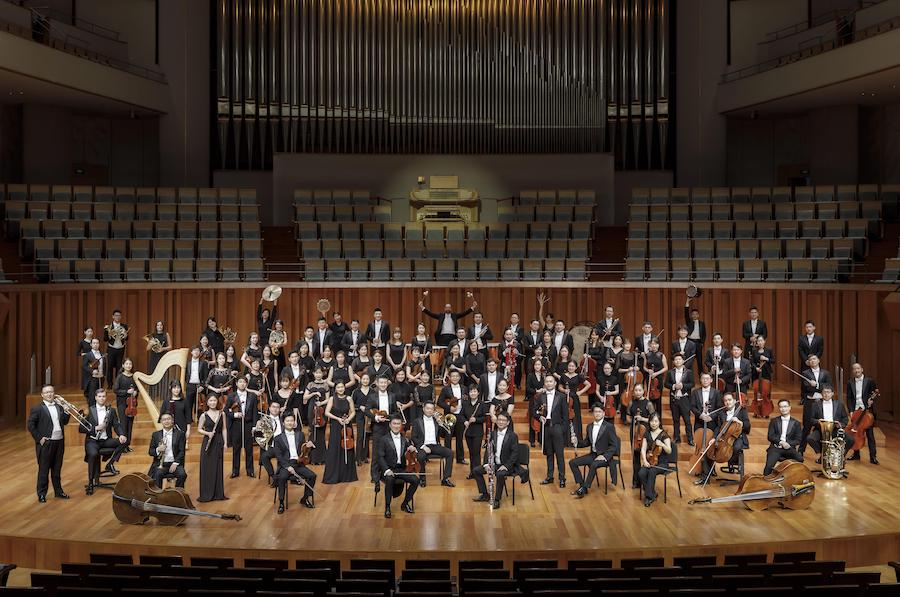
PERFORMERS:
Soloists:
Semyon Salomatnikov (trumpet)
Luo Wei (piano)
China National Center of the Performing Arts Orchestra
Conductor: Li Xincao
PROGRAMME:
Lyu Qiming
Ode to the Red Flag
Pyotr Tchaikovsky
Piano Concerto No. 1 in B-flat Minor, Op. 23
Chen Qigang
Joie éternelle for trumpet and orchestra
Alexander Scriabin
Poème de l'extase, Op. 54
The concert has one interval
The Piano Concerto No. 1 was composed by Tchaikovsky in the last two months of 1874 (until February 1875, the composer was busy with the instrumentation of the work). Apparently, while working on the Concerto, he showed it to his favorite student Sergey Taneyev. The adolescent (only eighteen years old!) student informed his friends: “I congratulate you all on the first Russian piano concerto. It was composed by Pyotr Ilyich.” It is known that Tchaikovsky initially dedicated the Concerto to Taneyev, but later replaced that dedication with another, to Hans von Bülow, who first performed the Concerto in Boston on October 25, 1875. The first night was a resounding success. Tchaikovsky wrote to Nikolai Rimsky-Korsakov: “Believe it or not, the Americans have quite an appetite: with each performance of my Concerto, Bülow had to repeat the finale”. Soon (November 1, 1875) the St Petersburg premiere followed, which initially caused contradictory responses. Nikolai Rubinstein, who at first strongly criticized the piece and required alterations (which Tchaikovsky flatly refused), three years later became one of the best performers of the Concerto. Tchaikovsky also spoke very highly of Sergey Taneyev’s manner of playing. “I often meet Taneyev,” he wrote to his brother Modest Ilyich Tchaikovsky. “If you only knew how magnificently he plays my Concerto!”
A century and a half later, Tchaikovsky’s First Concerto became as much of a “proper name” as Beethoven’s Fifth or Ninth Symphonies. It combines a bright heroic tone and dramatic pathos with a virtuoso decorative style and, at the same time, with the finest lyricism. The recitative rhythm, so characteristic of Tchaikovsky’s operas, easily and naturally passes into rounded “arioso” forms infused with the Russian and Ukrainian melodiousness. The First Piano Concerto is one of those pearls that have become a symbol of the world classical music. Who would not respond to its “call signs” today? Those broad horn introductions, majestic colonnades of piano chords, a powerful, dazzling main theme in the strings, supported by the brass, allow nobody to stay indifferent.
The Poem of Ecstasy (Le Poème de l’extase), like no other work by Alexander Scriabin, has reflected the composer’s philosophical concept with extraordinary clarity and force. Conciseness, laconism (the Poem lasts less than 20 minutes), crystalline clarity of musical form (despite the foggy, mystical literary program) have made The Poem of Ecstasy popular among the listening audience.
The variety of short musical formulas, which the composer called (maybe somewhat pompously at times) the motives of “yearning”, “will”, “pleasure”, “heights of creativity”, when put together, do not leave a kaleidoscopic impression. All the themes are linked together by the purposeful formation of the central idea, the steady movement towards its implementation. The musical evolution goes as if in circles; waves of ascent are replaced by moments of meditation and contemplation. All this diversity of inner states and moods is cemented by a steady ascent to the general culmination of the masterpiece. This ascent is dominated by the theme of “will” (it is assigned to the solo trumpet) and the theme of “self-affirmation”.
The dazzling epilogue of The Poem of Ecstasy amazes with its unprecedented scope and titanic power. The orchestra jingles, sparkles, shimmers, it seems, with all the colors of the sound spectrum; the brass rejoices, eight horns with their sockets up and the trumpet, supported by the organ pedal and the strike of the bell, proclaim the “self-affirmation” theme, sounding with truly superhuman strength.
The first performance of The Poem of Ecstasy took place on December 10, 1908 in New York City under the conduction of Modest Altschuler. The St Petersburg premiere soon followed (January 31, 1909) conducted by Felix Blumenfeld.
Iosif Raiskin
The orchestral overture Ode to the Red Flag by Lyu Qiming was first performed by the Shanghai Symphony Orchestra at the Shanghai Spring International Music Festival in 1965. This grandiose composition is an anthem praising the Motherland, the Communist Party and the red flag. The overture reflects the composer’s true experience, his deep affection for the country and the people. The masterpiece consists of three movements, all of them united by the single marching theme of the “red flag” drawn by the trumpet and horn, which first appears after a short introduction. In the middle movement of the overture, the theme changes: sometimes it jumps joyfully, sometimes it is lyrical, sometimes powerful and majestic. Finally, it develops into a march. In the reprise, it develops polyphonically and becomes even more majestic. The composer said: “For me, Ode to the Red Flag is a continuance of the national anthem. The red flag once fluttered in the wind in Tiananmen Square, and since then, the people of China have risen!”
When creating his concerto for trumpet and orchestra, Joie éternelle, the Chinese-French composer Chen Qigang was inspired by one of the oldest Chinese opera genres, Kunqu. This genre is distinguished by its refined and elegant lyrics, graceful style and delicate performance. As a child, the composer had become acquainted with a famous Kunqu work, The Peony Pavilion opera. The future composer had been so much impressed by the music, that, as an adult, he decided to return to the work. For his Concerto, Chen Qigang decided to use the melody from his favorite piece (qupai, which means “a fixed melody”). The composer once said: “When I composed this piece commissioned by the BBC Proms and other organizations, it seemed to me that this was an ideal opportunity to entrust this unforgettable melody to the sound of the trumpet, a very “Western” instrument. I imagine a soloist conveying the wild inner character of the music, while performing an elegant, beautiful melody”. When working on the piece, Chen Qigang deliberately set many challenges for the performer, not only in terms of musical expression and technique, but also in terms of physical fitness.
Aleksandra Vershinina
China NCPA Orchestra is the resident orchestra of the National Centre for the Performing Arts (NCPA), Beijing. Since its founding in 2010, the orchestra has fast established itself as one of the most adventurous and dynamic orchestras in the country and earned an international reputation through extensive performances abroad.
Numerous world-renowned artists have collaborated with the orchestra, including Lorin Maazel, Zubin Mehta, Valery Gergiev, Myung-Whun Chung, Christoph Eschenbach, Daniele Gatti, Fabio Luisi, Vladimir Ashkenazy, Leif Segerstam, Gunter Herbig, Shao-Chia Lu, Xian Zhang, Rudolf Buchbinder, Stephen Kovacevich, Khatia Buniatishvili, Lang Lang, Yuja Wang, Haochen Zhang, Víkingur Ólafsson, Kyung-Wha Chung, Vadim Repin, Siqing Lu, NING Feng, Jian Wang, Gautier Capucon, Alison Balsom, Sabine Meyer, Placido Domingo, Leo Nucci, Renee Fleming among many others. Lorin Maazel worked closely with the orchestra before his passing and praised the musicians for their “amazing professionalism and great passion in music”. Christoph Eschenbach also declared it as “one of the finest orchestras in Asia”.
Over the years, the orchestra has gained critical acclaim for its artistic excellence in both concerts and operas. To date they have played in over 70 NCPA opera productions, including classical repertoires such as Das Rheingold, Tristan and Isolde, Die Meistersinger von Nürnberg, Aida, Otello, Nabucco, Tosca, Turandot, The Marriage of Figaro, Don Giovanni, Eugene Onegin, and newly commissioned works Rickshaw Boy, The Long March, Fang Zhimin, The Jinsha River, Visitors on the Snow Mountain and The Dawns Here Are Quiet. Their live recording of The Ring without Words with its creator, Lorin Maazel, was released on SONY Music worldwide, the only recording the great maestro ever made with an orchestra from China. In 2019, the orchestra’s recording of Beethoven's Symphony No. 9 was awarded "Best Orchestral Album" at the 2018 Chinese Audiophile Vinyl Award. In 2021, the NCPAO released Beethoven’s Egmont becoming the first Chinese orchestra to record this masterpiece. In celebration of the decade tenure of its Music Director LÜ Jia, the orchestra released a selection of live recordings conducted by LÜ Jia in 2022. 2024 sees the NCPAO release the recordings of Bruckner’s complete numbered symphonies.
The orchestra has consistently offered creative and diverse programmes through its concert season. As part of its continuous efforts to promote contemporary music, the orchestra presented the China Premieres of major works by John Adams, Toru Takemitsu et al. and gave the World Premieres of dozens of substantial new orchestral works commissioned from composers across the globe, including Qigang Chen, ZHAO Jiping, Michael Gordon, Kalevi Aho, Huang Ruo, Bright Sheng, Bernd Richard Deutch, et al. It has also played a significant role in the NCPA's Young Composers Programme, providing a unique platform nurturing the next generation of composers in China.
Alongside its concert series, the orchestra has received widespread praise for its international appearances at the Kissingen Summer Music Festival and the Schleswig-Holstein Musik Festival and concerts in many cities in Germany, as well as in Sydney, Singapore, Seoul, Daegu, Abu Dhabi, Taipei and Macau. In 2014, the orchestra undertook its first North American tour and returned in 2017, where it performed at Carnegie Hall, Chicago Symphony Center, Davies Symphony Hall and other major venues in the US and Canada, under the baton of LÜ Jia. Musical America praised its “joyful confidence and youthful strength”. Concerto Net described it as “a polished, first rate ensemble”. In 2021, they appeared in "See Me: A Global Concert" along with world-wide artists, orchestras and choirs as part of the Opening Ceremony of the World Economic Forum’s Davos Agenda virtual event. In 2022, the orchestra recorded for the Opening Ceremony of the Beijing 2022 Winter Olympics, accompanying billions of viewers to witness the lighting of the Olympic flame. In April 2023, musicians from the orchestra visited South America performing joint concerts with Sao Paulo Symphony Orchestra in Brazil and Instituto Superior de Arte de Teatro Colon in Argentina.
With its commitment to educational and outreach activities, the orchestra has presented a series of Weekend Matinee Concerts at its home venue, providing local audience specially selected programmes and accessible ticket prices. The orchestra also frequently initiates wide-reaching educational projects in association with educational institutions across the city. In 2020, the orchestra launched an online concert series drawing an average audience of 30 million viewers. In 2024, the Beijing Youth Orchestra, operated by the NCPAO, participated in World Orchestra Week and made its international debut at Carnegie Hall. April 2021 saw the orchestra complete their first six-city national tour, which Music Weekly praised as "a series of sophisticated programs in concerts that blew the roof off,” followed by the second national tour in March 2023.
In February 2012, LÜ Jia took up the post of Chief Conductor, succeeding Zuohuang Chen, NCPA’s then Artistic Director of Music as well as a founder of the orchestra. In January 2017, LÜ Jia started serving as NCPA's Artistic Director of Music and the NCPA Orchestra's Music Director. In 2022, LAI Jiajing was appointed as assistant conductor.


The highlighting of performances by age represents recommendations.
This highlighting is being used in accordance with Federal Law N436-FZ dated 29 December 2010 (edition dated 1 May 2019) "On the protection of children from information that may be harmful to their health"

